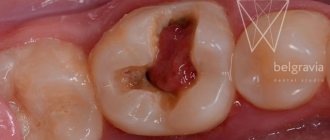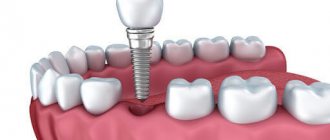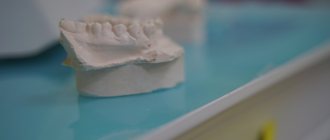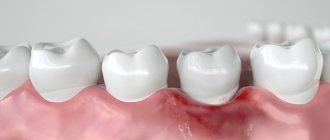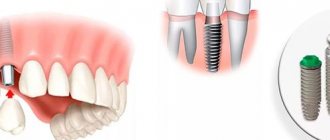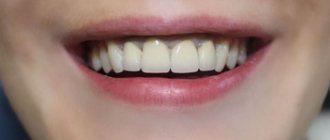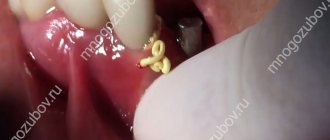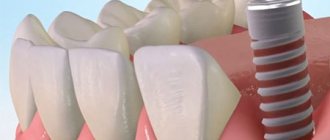- What is implantation?
- Rejection symptoms
- Why does rejection happen?
- Treatment
- Recommendations
- Is it possible to undergo re-implantation?
- How to avoid complications
Among dental procedures, one of the most popular is dental implantation. Its demand is justified by its main purpose - restoration of teeth or a complete dentition. Often patients are afraid to decide on a mini-surgery not only because of the fear of pain, but also because of the fear of complications, especially with regard to rejection of the artificial root. Before you decide to undergo implantation, we recommend that you find out why a dental implant is rejected, what the symptoms and consequences may be.
How does an implant normally take root?
After installation of the implant, a period of osseointegration with the bone tissue of the jaw begins, which goes through three stages:
- Initial (3-4 weeks) Spongy bone tissue begins to form around the implanted implant. Until it is mature and has a low density, it is better to avoid chewing loads so as not to disturb the position of the implant in the jaw.
- Formation of mature bone (16-18 weeks) Spongy tissue is replaced by denser (lamellar) tissue. Completely fills the space between the implant and the jawbone. Provides stability sufficient to load the implant with a prosthetic structure.
- Final (up to one and a half years) The implant finally fuses with the bone tissue. After completion of this period, the success of implantation is determined. If the patient follows the rules of care and use, nothing should happen to the artificial root.
After engraftment, the implant becomes a full-fledged part of the dental system and can last a lifetime .
Reasons for rejection
Medical errors
- Installation of low-quality implants Components of inexpensive systems, when in contact with jaw structures, can provoke the growth of scar tissue rather than bone. As a result, fibrosis develops and the structure falls out.
- Inadequate examination and preparation If the parameters of bone tissue, its density and volume were not taken into account, and bone grafting was not performed, the implant simply will not be able to stabilize in conditions of bone deficiency.
- Failure to comply with the installation protocol Rejection can occur if the implantologist incorrectly calculates the implant positioning point, damages the bottom of the maxillary sinus in the upper jaw or the maxillary nerve in the lower jaw, overheats the bone or forms a hole that does not fit the size of the implant. The implant may not take root due to infection due to failure to maintain sterility during the operation.
- Prosthetic errors When installing a prosthesis or crown, it is important to calculate the future loads on the implant, select an orthopedic design based on the bite, and prevent the cement from getting under the gum. If these conditions are not met, there is a high probability of injury and infection of soft (mucositis) and bone tissue (peri-implantitis), subsequent loosening and loss of the implant.
Associated with the patient
- Smoking Tobacco smoke constricts blood vessels and leads to impaired blood circulation in the gums and bone tissue, as a result of which the nutrition of the structures surrounding the implant deteriorates.
- Allergies Titanium is a material that is biocompatible with jaw structures, but can cause an allergic reaction when installing low-quality systems that contain impurities.
- Health Issues Some systemic diseases of the body increase the likelihood of rejection. But many are not a categorical contraindication and can be adjusted before implantation.
- Unsuitable bone structure If the bone structure is porous, even if there is sufficient volume, the implant will not hold. To prevent this, the bone is further strengthened.
- Poor hygiene At the junction of the implant and the crown, there is a high risk of accumulation of bacteria that provoke inflammation. To prevent infection, you need to thoroughly brush your teeth at home and visit the dentist for professional hygiene.
- Violation of operating rules If the patient exceeds chewing loads, chews bones, candies, the crown on the implant may not withstand and crack, its connection with the abutment may be disrupted. There is a high probability of inflammation of surrounding tissues, peri-implantitis and rejection.
Re-implantation
Is it possible to have a second operation if the implant fails? Yes, but before that it is necessary to eliminate foci of infection and wait for the damaged tissue to recover. This usually takes about two months. It is important not to delay repeated surgery for too long: after a long break, the bone begins to atrophy (decrease), and then bone grafting may be needed.
The final decision on re-implantation is made by the doctor, based on the reason for the rejection of the structure. If this is a chronic disease or the body’s reaction to a foreign body, then most likely the result will be the same, and it is better to choose another method of restoring teeth.
If the cause of rejection was related to smoking (the patient does not want to give up the bad habit for a while), then re-implantation will also be pointless.
How and why rejection occurs at different times
Express rejection
Occurs with a coarse porous bone structure. This feature makes it impossible to create a reliable support for the titanium root - the bone is not able to provide the implant with the necessary stability and nutrition, and cannot provide sufficient tension to hold the implant. In our Center, the problem is solved with the help of growth stimulants (morphogenetic proteins), which are attached to the neck of the implant during installation and activate the growth and compaction of the surrounding bone mass.
Also among the common causes of early rejection:
- Excessive load on the implant with the crown at the time of engraftment during express implantation.
- Infection of jaw tissues when installing an implant immediately after tooth extraction with inflammation at the root.
The main cause of implant failure is peri-implantitis. Infectious inflammation of the tissue around the implanted rod, leading to progressive loss of the jaw bone. It develops immediately after installation, several months and even years later.
Deferred period
If rejection does not occur a month or two after implantation, then osseointegration took place without complications. However, there are cases of later rejection when a permanent crown was installed on the implant and everything looks fine. Among the reasons:
- Prosthetic errors when the angular chewing load on the titanium root is increased. It manifests itself as pain when chewing and redness of the gums.
- Inflammation of the tissues in the implant area due to a bacterial process that develops due to the accumulation of food debris between the teeth. It may be asymptomatic at first, but over time it is accompanied by bleeding gums - it looks inflamed, swollen, like periodontitis. If measures are not taken, after a year or two this condition will lead to the structure falling out.
How often does it occur - what is the percentage of non-engraftment
Implant rejection is an extremely rare occurrence; according to statistics, it occurs in 1-2% of cases . When installing systems from manufacturers who value their reputation, the figure is even lower, amounting to 0.2-0.5% . These manufacturing companies carefully examine each case of rejection and eliminate negative factors. Professional clinics using original products and following installation protocols guarantee a 99% survival rate.
The guarantee for implantation in our Center is unlimited !
We work exclusively with reliable, time-tested implants from Nobel Biocare (USA) . We carry out detailed diagnostics to identify and prevent possible risks, and strictly follow the surgical protocol. Together with the manufacturer, we provide a double lifetime warranty in Dr. format. Levin LifeTime Warranty!
Levin Dmitry Valerievich Chief physician and founder of the Doctor Levin center
Signs and symptoms - how rejection manifests itself
Swelling, pain, fever and bleeding of the gums in the first 5-7 days after implant installation are normal phenomena that go away on their own. If symptoms persist after the specified period and increase, you should urgently consult a doctor.
Non-engraftment of the implant is indicated by persisting for more than 7 days.:
- inflammation and swelling of soft tissues
- bleeding
- discharge of pus
- bad smell
- strong pain
- body temperature 38ºС and above
- implant exposure
- mobility of the installed structure
Sometimes rejection occurs asymptomatically or with one of the above symptoms. Regardless of what signs appear, you should be attentive to your own well-being. If something bothers you, contact the clinic immediately. In the early stages of inflammation, there is a greater chance of saving a new tooth!
Content
- Symptoms
- Why implants don't take root
- Protect yourself from problems
Implantation is a complex procedure that requires skilled execution. During the healing period, swelling may form and pain may be felt, because the jawbone and gums are injured. Bleeding is possible. For surgical intervention, these consequences are normal and disappear within a few days.
There are also more complex consequences. Implant rejection is the most unpleasant of them all.
What do we do to avoid unpleasant consequences?
Doctor Levin Center specializes in implantation. Since 2004, it has been the Nobel Biocare Center of Clinical Excellence in Eastern Europe.
We install the best implants
We work exclusively with Nobel Biocare implant systems. They have their own markings to protect against counterfeiting. The survival rate is 99.3% - the highest rate in dental implantology. They solve any edentulous problems, even against the background of acute jaw bone deficiency. They have a micro-structured active surface, which accelerates osseointegration with jaw tissues and activates regeneration processes. Nobel implants have a lifetime warranty from the manufacturer . The center, in turn, provides a lifetime guarantee for the work of doctors .
We eliminate possible risks
Before implantation, it is important to exclude the patient from diseases that could negatively affect the implant’s healing. Among them: blood diseases, uncompensated diabetes mellitus, pathologies of the immune system, oncology. To identify health problems, anamnesis is collected, blood tests are prescribed, and, if necessary, consultation with specialized specialists, such as a cardiologist, endocrinologist, or phlebologist. Most chronic diseases are not a categorical contraindication; they are corrected before implantological treatment.
It is equally important to study the condition of the bone tissue into which the implant will be installed. For this purpose, the Center performs computer diagnostics in an expanded ENT mode , which allows one to determine bone density, its height and width, the location of the mandibular nerve, and the condition of the maxillary sinuses. The data is used when planning the surgical stage.
Thinking through a treatment plan
Planning is an important step in preparing for surgery to predict the results of treatment. Provides for the selection of implant models, their location in the jaw, taking into account the anatomical features of the dentofacial apparatus and the condition of the bone. In our Center computer planning , a preliminary virtual rehearsal of the operation is carried out to ensure the accuracy of the real operation and reduce the likelihood of complications.
We work according to a low-traumatic surgical protocol
We use only original components and gentle installation protocols that speed up engraftment. Since 2012, we have been performing implantation and osteoplastic surgeries exclusively using the minimally invasive ultrasound protocol PiezoSurgery. The bone tissue is carefully prepared, chips and fractures of the jaw structures are excluded, healing in such conditions is quick and uncomplicated . An ultrasonic scalpel eliminates damage to soft tissues - nerves, blood vessels, the membrane of the maxillary sinus (during surgery on the upper jaw), and the jaw nerve (during implantation of lower teeth).
We work with the best implantologists
Our doctors are excellent students of medical universities and have been trained on the basis of Nobel Biocare educational programs. They have more than 7 years of experience, are fluent in advanced treatment methods, and successfully apply them in practice. Every day we carry out complex operations to install implants and bone grafting. The salary of our implantologists and maxillofacial surgeons is 2 times higher than the Moscow average, which allows us to work with the best specialists.
We maintain sterility
This is one of the main conditions for successful implantation. Our Center operates in accordance with the Anti-AIDS - Anti-Hepatitis program . Equipped with its own sterilization stations. During the operation, the doctor uses only sterile instruments. Each implant is packaged in a sterile box, which is opened immediately before installation. The risk of infection is zero.
We take action in a timely manner
We never leave patients to their fate after implantation. Everyone receives a free post-operative set of medications for home use. For improved recovery, the Center has developed a unique complex of accelerated rehabilitation to reduce pain and prevent the formation of swelling and hematomas. The rehabilitation period is constantly monitored by a doctor , patients are invited to scheduled examinations. The doctor is on call around the clock in case the patient has any questions during the recovery period. After the end of the recovery stage, patients regularly undergo medical examinations (at least once a year) to monitor the situation in the long term.
It is possible to avoid implant rejection - the main thing is to foresee all the risks, conduct a thorough examination, and strictly follow the surgical protocol.
What should patients do to prevent the situation?
- We recommend that you carefully consider the choice of clinic . The risks are minimal when the operation is performed by an experienced doctor in a well-equipped clinic. Large Centers do not skimp on equipment and staff training. When choosing a dentist, you can rely on reviews from patients who have already undergone treatment there.
- Go through a full examination , tell the doctor about all your health problems, without hiding anything.
- When choosing implants you should not save money ; in this situation, the price is proportional to the quality. Popular brands have more guarantees and fewer risks.
- Follow the doctor's recommendations in the postoperative period, including giving up bad habits.
Recommendations to help avoid implant failure:
- Eliminate solid foods from your diet to avoid overloading the implant.
- Stop smoking - smokers have a significantly higher risk of rejection
- Take prescribed medications
- Avoid overheating and hypothermia
- Maintain oral hygiene - brush your teeth 2-3 times a day, rinse your mouth with antiseptic solutions, use floss or irrigator to remove food debris from the interdental spaces
- Visit the clinic as scheduled.
Recommendations
Implant failure is rare, but you can reduce the likelihood of such a problem to a minimum if you read and adhere to the recommendations before implantation.
Advice from implantologists:
- select the clinic and doctor with special care (read the clinic’s documentation and reviews);
- undergo a preliminary examination and, if necessary, treat pathologies that are a contraindication to surgery;
- strengthen your gums before and after implantation;
- do not hide the presence of contraindications from the specialist;
- follow your doctor's recommendations;
- do not violate the rules of oral hygiene.
Preparation for the procedure for implantation and further oral care is the best prevention of negative consequences.
Is it possible to save an implant if rejection symptoms have already appeared?
If signs of implant rejection appear, you must immediately contact the clinic . The sooner measures are taken, the greater the chance of saving the new tooth.
The measures taken are determined by the doctor based on an examination of the installed implant and X-ray data.
Treatment tactics are individual in each clinical case. Here are some example diagrams:
- Inflammation at the initial stage affects the surrounding soft tissues. The plug screw is unscrewed from the implant, the gums in the area of contact with the implant and the plug are cleaned and disinfected. The screw is returned to its place and sutured.
- The inflammation affects the deeper periodontal tissues, but does not go beyond them. The gums are opened, the affected area is cleaned and disinfected, and a course of antibiotic therapy is prescribed.
- The infection spreads to the bone tissue. The degree of bone destruction is revealed. After removing necrotic tissue and stopping the inflammatory process, bone grafting is performed (directed bone regeneration using protective membranes).
- Serious tissue damage is accompanied by bone loss. A decision is made to remove the structure. The bone tissue is cleaned, and after eliminating the inflammatory process, it is restored using one of the methods of osteoplasty. Next, the question of the possibility of re-implantation is decided.
Treatment
After implantation, the condition of the oral cavity and the healing process must be monitored by the implantologist (for this purpose a control visit is carried out), and the patient himself. Experts advise paying attention to symptoms during the rehabilitation period. It must be remembered that rejection of the artificial root can occur even after several months, since the engraftment period takes up to 6 months.
If pathological symptoms occur, you must immediately contact the specialist who performed the operation. As a rule, if the implant is not accepted by the body, an inflammatory process begins. The longer the complication progresses, the more difficult it is to further treat.
Before unscrewing the implant, the doctor may order diagnostics (x-rays). Based on the results of the examination, a decision is made on the need to remove the prosthesis.
Treatment methods:
- opening the gums to cleanse the cavity of pus;
- unscrewing the plug from the implant for cleaning;
- complete removal of the implant.
For any type of complications accompanied by an inflammatory process, antiseptic treatment of the area where the prosthesis is installed and antibiotics are necessary. In each case, the treatment method is determined individually.
